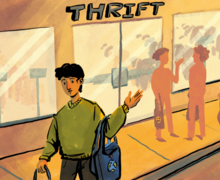Kramer: Uber expansion to Syracuse would raise polarizing conversation
App-based, ride-hailing service Uber has expanded services to new cities in the United States and all over the world as part of a continual effort to increase the reach of its services.
Uber has not yet signaled any plans to expand to Syracuse, but with its hefty $18 billion valuation and a clear intent to expand, it’s reasonable to expect a knock at the door.
Portland, Maine, with a population of just over 200,000, was one of the more recent additions. A Portland Press-Herald article from Oct. 2 quoted Billy Guernier, general manager of regional expansion for Uber, saying “We’ve been getting ready for Portland for a number of weeks and months. We have thousands of riders already signed up.”
Uber added Anchorage, Alaska to its list of territories in September. Service is popping up in East Asia and Europe. So our question as SU students might be: when will Uber expand to Syracuse? If the day that Uber wants to set up shop here ever comes — and it likely will — then SU students have a responsibility to have an intelligent discussion about how the city should handle it.
We have to admit that we’re an awfully appealing market. A lively downtown scene added in with a vibrant, sprawling college campus suggests a whole lot of opportunity for rides on cold weekend nights. But the advantages of having personal drivers at students’ fingertips almost certainly guarantees an arguably unfair decline for traditional local taxi companies, like the ones waiting patiently outside of the train station or scaling Comstock and Ostrom avenues on late nights.
Uber is bound to be popular with SU students, but we should be intelligent enough to see that falling in love with a smartphone app that hails a sleek ride could also crumble an existing industry that holds up thousands of jobs. And it’ll do it through escaping regulatory policy and insurance requirements that yellow cabs have to deal with.
Powerful taxi lobbies cringe over the significantly smaller regulatory barriers that Uber faces when it operates. Seattle challenged that inequality by disallowing any more than 150 Uber or Lyft, a similar ride-hailing service, cars from operating at a given time. Seattle City Council Member Tim Burgess told the Seattle Post-Intelligencer in March that this was a move that “would be like prohibiting Netflix to protect Blockbuster.”
Do we place greater value on having a great service available to us, or preserving the livelihoods of taxi drivers in Syracuse who might be at a dead end if their business gets upended?
It’s a fundamental question of American capitalism. Life for one could suggest death for another. If Uber comes knocking, a smart conversation here on campus might lead us to agree that new city law requiring background checks and mandatory insurance minimums for Uber drivers would help level the playing field and preserve fair competition for our rides. Maybe we could agree that circumventing city policy on taxis simply by disguising as a “rideshare” company might not be a fair strategy. But would we care about what is fair or what is better?
It’s fascinating just how deep a debate about a taxi can go. And while Uber isn’t here yet, it’s a debate worth having when the time comes. Let’s be informed and prepared enough to discuss it.
Phil Kramer is a sophomore finance and economics major. His column appears weekly. He can be reached at pwkramer@syr.edu.
Published on November 3, 2014 at 12:04 am





